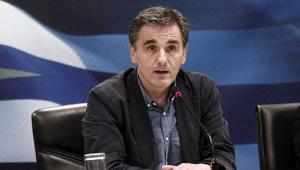As expected, the meeting saw eurozone finance ministers confirm that the raft of harsh austerity measures passed by Greece over the last month were sufficient to unlock the second tranche of Greece’s third €86bn bailout package, which will keep the country afloat over the summer.
While some debt relief measures were agreed to, the International Monetary Fund appears to have been forced to back down from its insistence that Greece needs “upfront” and “unconditional” relief from its colossal €321bn in debts.
Following the meeting, Eurogroup president Jeroen Dijsselbloem explained that ministers had agreed on measures that can be taken in the short, medium and long term to ease Greece’s debt burden.
The measures, which include lower interest rates, “smoothing out” repayment schedules and possible loan buyouts, aim to ensure Athens’ debt repayments do not exceed 15% of national income until 2030, and 20% from then onwards.
The most ambitious measures come into play in 2018, and include Greece regaining access to profits made by the European Central Bank from buying eurobonds. Greece had been barred from collecting these in 2014 due to problems with its bailout programme, but it looks likely these will now be restarted.
This marks one of the major concessions the IMF’s Europe chief Poul Thomsen said the fund had made during the negotiations.
In a hard-hitting analysis of Greece’s debt sustainability released on the eve of the critical Eurogroup meeting, the IMF said that debt relief should be approved before the programme’s end and should be unconditional.
While IMF staff have said they will recommend its board approves the programme, the issue of whether the fund will contribute to the third bailout is still uncertain.
Its analysis yesterday had sparked fears it would not contribute to a programme without significant debt relief. The IMF’s participation is a key requirement from Germany in particular, and would enhance the programme’s credibility.
Dijsselbloem said the issue of whether the fund comes on board will be dependent on the results of a new debt sustainability analysis and assessment of the possible relief measures agreed by the Eurogroup last night.
The fund had also complained that the programme’s targets, including the requirement for Greece to achieve a budget surplus of 3.5% of GDP, excluding debt repayments, are unachievable.
Until last night, Greece’s creditors, particularly the IMF and Germany, had been locked in a standoff that threatened to derail the rescue package. Germany is particularly averse to the possibility of debt relief for Greece.
But following tax increases and spending cuts passed into law by the Greek parliament on Sunday and earlier this month initial agreement for the release of funds has been secured.
Greece still needs to implement a few “prior actions” before funds will be disbursed. These include Greece carrying through its promised reforms on privatising state assets, reducing its pensions burden and changes to its tax system.
Once these are complete, Greece will receive the €10.3bn into two tranches, starting with €7.5bn in June and then €2.8bn in September. This will prevent Greece from defaulting on billions of euros of loan repayments due this summer.
Dijsselbloem said: “This is an important moment in the long Greek programme – an important moment for all of us since last summer when we had a major crisis of confidence between us – that confidence has begun to recover.”












